Module 4 Rules and suggestions课件(共34张PPT)2024-2025学年英语外研版九年级下册
文档属性
| 名称 | Module 4 Rules and suggestions课件(共34张PPT)2024-2025学年英语外研版九年级下册 | 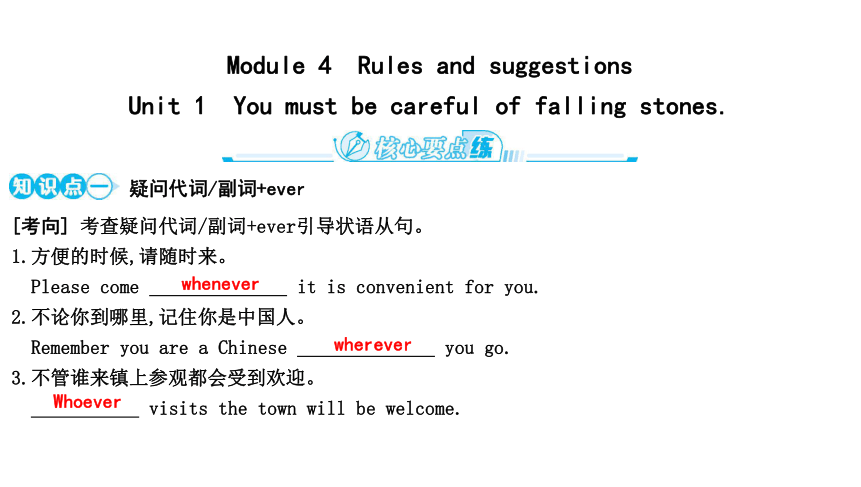 | |
| 格式 | pptx | ||
| 文件大小 | 447.6KB | ||
| 资源类型 | 教案 | ||
| 版本资源 | 外研版 | ||
| 科目 | 英语 | ||
| 更新时间 | 2024-07-06 00:14:30 | ||
图片预览

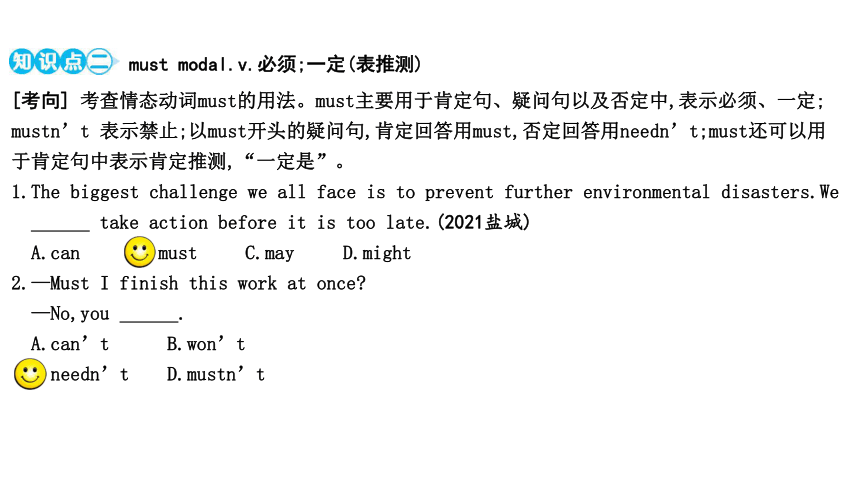
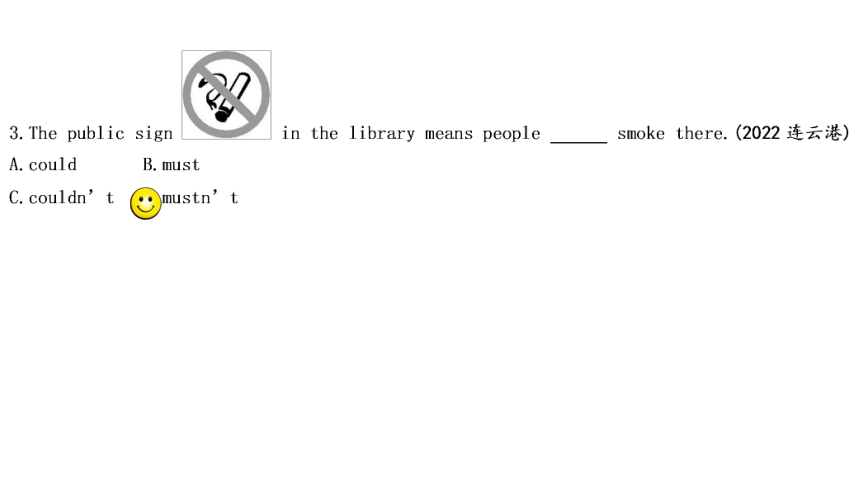
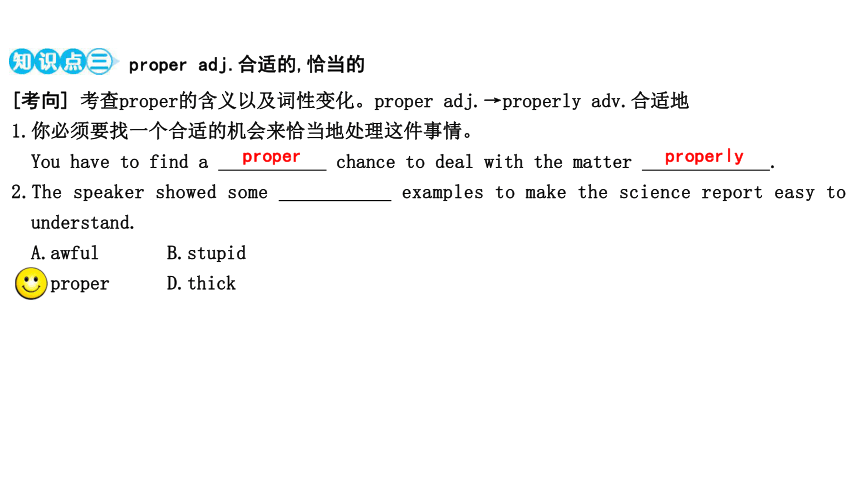
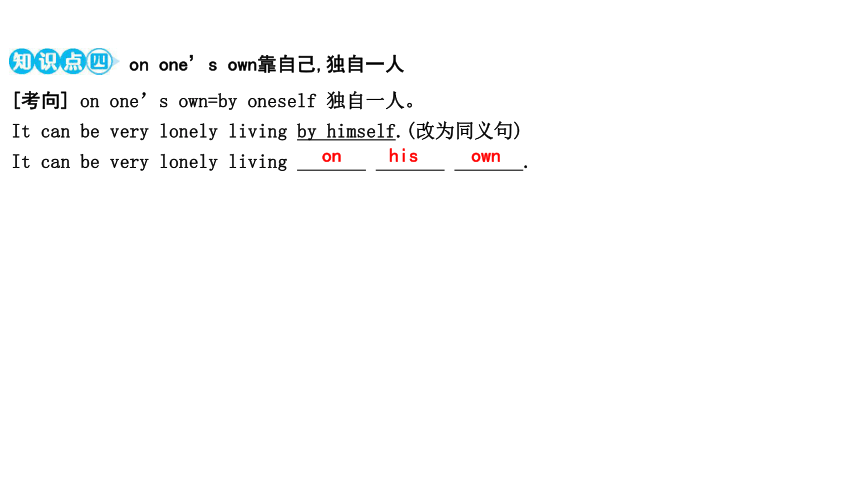
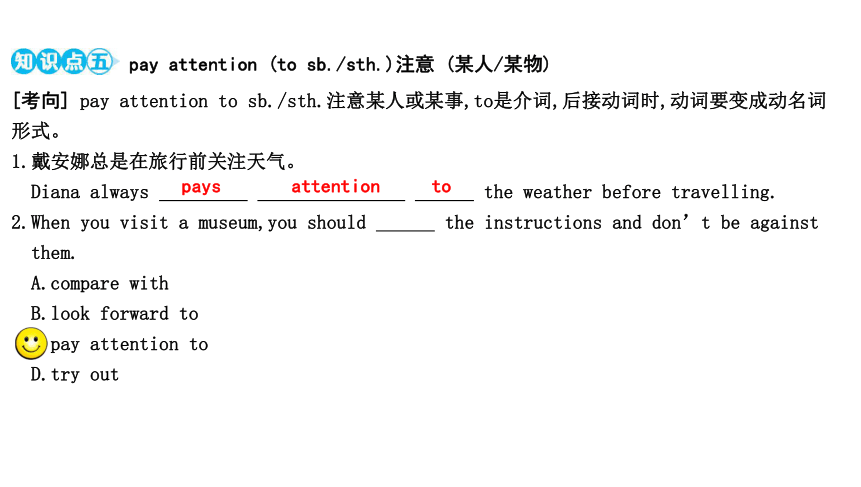
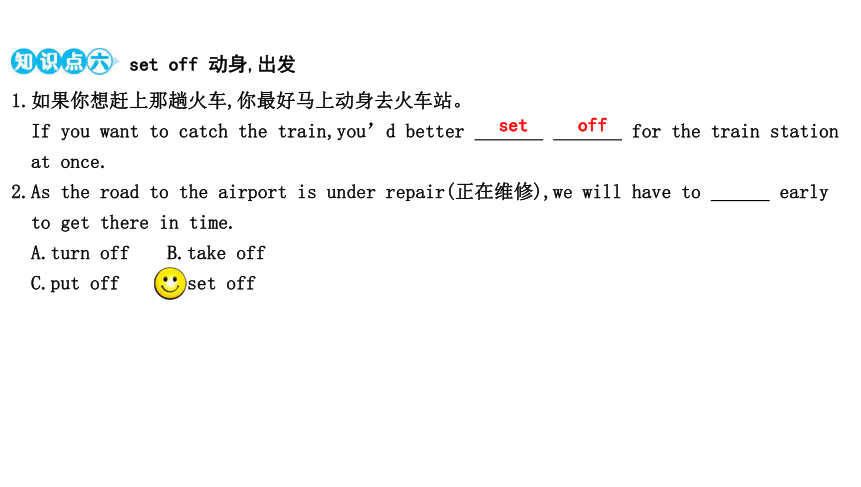
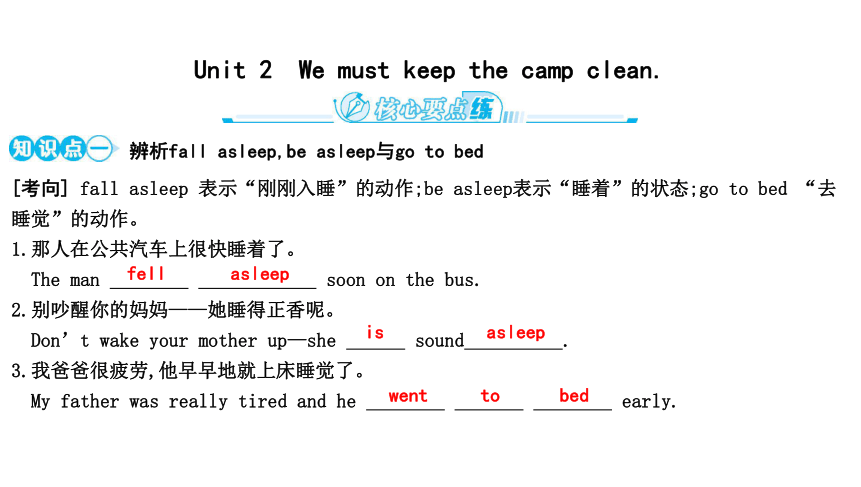
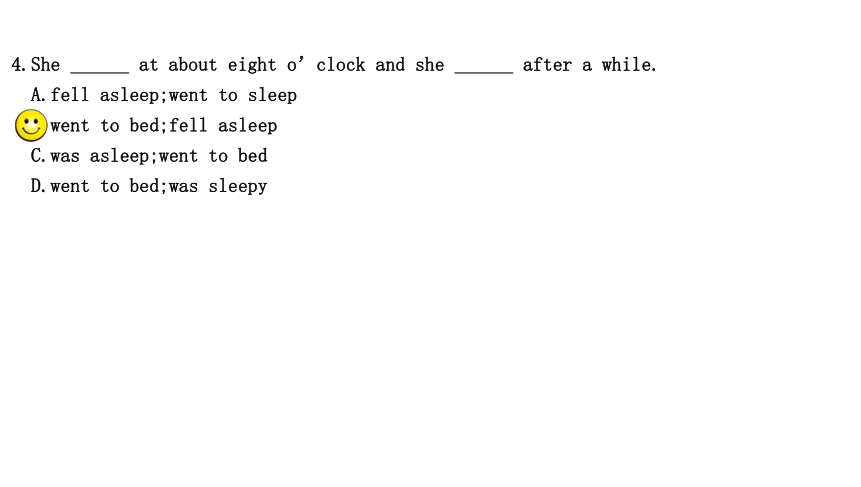
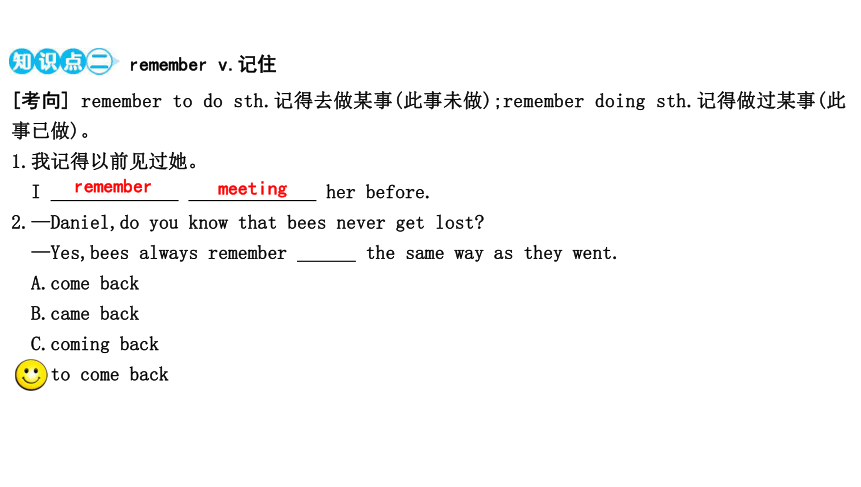
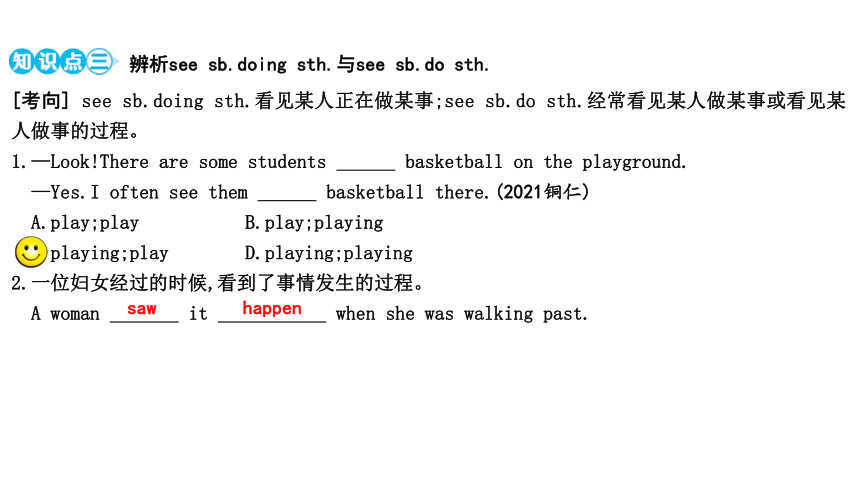
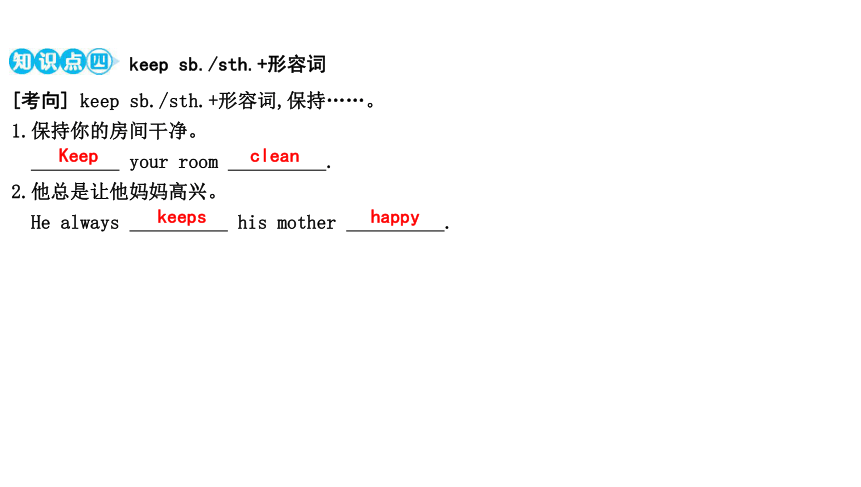
文档简介
(共34张PPT)
Module 4 Rules and suggestions
Unit 1 You must be careful of falling stones.
疑问代词/副词+ever
[考向] 考查疑问代词/副词+ever引导状语从句。
1.方便的时候,请随时来。
Please come it is convenient for you.
2.不论你到哪里,记住你是中国人。
Remember you are a Chinese you go.
3.不管谁来镇上参观都会受到欢迎。
visits the town will be welcome.
whenever
wherever
Whoever
must modal.v.必须;一定(表推测)
[考向] 考查情态动词must的用法。must主要用于肯定句、疑问句以及否定中,表示必须、一定;
mustn’t 表示禁止;以must开头的疑问句,肯定回答用must,否定回答用needn’t;must还可以用于肯定句中表示肯定推测,“一定是”。
1.The biggest challenge we all face is to prevent further environmental disasters.We
take action before it is too late.(2021盐城)
A.can B.must C.may D.might
2.—Must I finish this work at once
—No,you .
A.can’t B.won’t
C.needn’t D.mustn’t
proper adj.合适的,恰当的
[考向] 考查proper的含义以及词性变化。proper adj.→properly adv.合适地
1.你必须要找一个合适的机会来恰当地处理这件事情。
You have to find a chance to deal with the matter .
2.The speaker showed some examples to make the science report easy to
understand.
A.awful B.stupid
C.proper D.thick
proper
properly
on one’s own靠自己,独自一人
[考向] on one’s own=by oneself 独自一人。
It can be very lonely living by himself.(改为同义句)
It can be very lonely living .
on
his
own
pay attention (to sb./sth.)注意 (某人/某物)
[考向] pay attention to sb./sth.注意某人或某事,to是介词,后接动词时,动词要变成动名词形式。
1.戴安娜总是在旅行前关注天气。
Diana always the weather before travelling.
2.When you visit a museum,you should the instructions and don’t be against
them.
A.compare with
B.look forward to
C.pay attention to
D.try out
pays
attention
to
set off 动身,出发
1.如果你想赶上那趟火车,你最好马上动身去火车站。
If you want to catch the train,you’d better for the train station
at once.
2.As the road to the airport is under repair(正在维修),we will have to early
to get there in time.
A.turn off B.take off
C.put off D.set off
set
off
Unit 2 We must keep the camp clean.
辨析fall asleep,be asleep与go to bed
[考向] fall asleep 表示“刚刚入睡”的动作;be asleep表示“睡着”的状态;go to bed “去睡觉”的动作。
1.那人在公共汽车上很快睡着了。
The man soon on the bus.
2.别吵醒你的妈妈——她睡得正香呢。
Don’t wake your mother up—she sound .
3.我爸爸很疲劳,他早早地就上床睡觉了。
My father was really tired and he early.
fell
asleep
is
asleep
went
to
bed
4.She at about eight o’clock and she after a while.
A.fell asleep;went to sleep
B.went to bed;fell asleep
C.was asleep;went to bed
D.went to bed;was sleepy
remember v.记住
[考向] remember to do sth.记得去做某事(此事未做);remember doing sth.记得做过某事(此事已做)。
1.我记得以前见过她。
I her before.
2.—Daniel,do you know that bees never get lost
—Yes,bees always remember the same way as they went.
A.come back
B.came back
C.coming back
D.to come back
remember
meeting
辨析see sb.doing sth.与see sb.do sth.
[考向] see sb.doing sth.看见某人正在做某事;see sb.do sth.经常看见某人做某事或看见某人做事的过程。
1.—Look!There are some students basketball on the playground.
—Yes.I often see them basketball there.(2021铜仁)
A.play;play B.play;playing
C.playing;play D.playing;playing
2.一位妇女经过的时候,看到了事情发生的过程。
A woman it when she was walking past.
saw
happen
keep sb./sth.+形容词
[考向] keep sb./sth.+形容词,保持……。
1.保持你的房间干净。
your room .
2.他总是让他妈妈高兴。
He always his mother .
Keep
clean
keeps
happy
hang v.悬挂,吊;吊死,绞死
[考向] hang 动词的词义及用法。hang 作“悬挂,吊”讲时,过去式和过去分词为hung;作“绞
死,吊死”讲时,过去式和过去分词为 hanged。
1.把你的大衣挂到墙上。
your coat on the wall.
2.那个凶手因谋杀被处以绞刑。
The murderer was for murder.
Hang
hanged
put up搭起;张贴;举起
1.Families usually new pictures of flowers or fish before the Spring Festival.
A.give up B.put up
C.set up D.make up
2.如果你有任何问题,请举手。
Please your hand if you have any questions.
put
up
模块写作指导
本模块的话题是“规则与建议”,旨在培养学生提出建议和描写规则的能力,包括应该做和不应该做的事情。
常用句型
1.每个人都应该遵守公共规则。
Everyone should obey public rules.
2.以下是一些有益眼睛健康的好建议。
Here are some good suggestions for eye health.
3.我们一定不能做危险的事情。
We mustn’t do anything dangerous.
4.我们应当待人友善,助人为乐。
We should be friendly to others,and be ready to help others.
5.如果每个人都行为得体,我们的城市将会变得越来越美丽。
If everyone behaves well,our city will be more and more beautiful.
1.写作要求
现在,戴眼镜的学生越来越多,为此,国家把每年6月6日定为全国爱眼日。请你结合自己的体会,就如何爱护眼睛,给校报英语栏目写一篇短文。内容包括:
(1)吃有益于眼睛的食物,如胡萝卜、鸡蛋等;
(2)多做眼保健操,长时间用眼后可看看远方;
(3)养成良好的用眼习惯,如不躺着玩手机或看书等。
注意:(1)词数80~100;
(2)可适当增加细节,以使行文连贯。
2.思路点拨
(1)体裁:说明文
(2)人称:第一人称、第二人称
(3)时态:一般现在时
(4)写作导图:
3.范文借鉴
Nowadays,more and more students are getting nearsighted,so National Eye-Care Day is set on June 6 every year.As we all know,eyes are the windows to the soul.We should try our best to protect them.Here are some good suggestions for eye health.
First,eat some food that is good for eyes,such as carrots and eggs.Second,do more eye exercises to make them relax.Also,it’s helpful to look far from time to time after studying for a long time.Finally,make sure to have a good habit of using your eyes.Don’t read books or use a mobile phone when you’re lying in your bed.
In a word,eyes are so important that all of us should do what we can to keep them healthy.
模块语法突破
1.Whenever you go walking in the hills,you should always wear proper clothes.
2.And you have to keep together so you don’t get lost.
3.You mustn’t walk too close to the edge of the hill path because you might fall
and hurt yourselves.
4.Can we go rock climbing
5.You may need some water.
情态动词的基本用法
情态动词本身有一定的意义,但不能独立作谓语,没有人称和数的变化,后面必须接动词原形。常见的情态动词有: may,must,need,have to 等,具体用法见下表:
1.can/could
情态动词 用法 例句
can 表示能力,意为“能、会”,可与be able to互换。 Sam can speak English well.
表示请求、允许,意为“可以”。 Can I borrow your bike
表示推测(惊讶、怀疑、不相信的态度),用于疑问句、否定句和感叹句中。 He can’t be at home.
could can的过去式,意为“能、会”,表示过去的能力。 He could play the piano well when he was young.
在疑问句中表示委婉的请求。 Could I have a cup of tea
2.must /have to
情态动词 用法 例句
must 表示主观看法,意为“必须、应该”。 You must finish your homework first!
must的否定式mustn’t,表示“禁止,不允许”。 You mustn’t smoke here.
must表示推测,可能性(只用于肯定的陈述句)。 He must know my address.
must引导的疑问句,否定回答用needn’t/ don’t have to。 —Must I finish my work now
—No,you needn’t/don’t have to.
have to have to意为“不得不”,表示客观原因。 He had to stay at home because of the heavy rain.
3.may/might
情态动词 用法 例句
may 表示请求、许可,意为“可以”;表示祝福和愿望。 You may sit here if you want.
May you be happy!
may引导的一般疑问句的否定回答用can’t /mustn’t。 —May I look at your CD player
—No,you mustn’t/can’t.
表示推测、可能性(不用于疑问句)。比must可能性小。 He may know the answer.
might may的过去式。 He asked if he might go home.
表示请求、许可,语气比may更委婉。 Might I smoke here
表推测,比may可能性小。 He might be sleeping now.
4.need
5.should/shall
情态动词 用法 例句
need 表示需要,主要用于否定句和疑问句中,肯定回答用must,否定回答用needn’t。 —Need I turn off the light now
—Yes,you must./No,you needn’t.
情态动词 用法 例句
should 用于各人称,表示劝告、建议,意为“应该、应当”。 You should come to the party on time.
shall 用于第一人称,表示征求对方意见,意为“……好吗 ”。 Shall we ride our bikes to the park
shall 作情态动词,用于陈述句的第二、三人称,表示说话人的意愿,有命令、警告、强制、允许等含义。 You shall do as I told you.
6.will/would
情态动词 用法 例句
will/ would 作情态动词,表示决心、意愿,意为“要……,想……”。 We will take a walk after supper.
He said he would do anything for me.
用于疑问句中,常用于第二人称,表示请求、征求意见。 Will/Would you please do the dishes
1.You are ill,Tom.You see a doctor.
2.Children play basketball in the street.
3.If you are not careful,a car hit you.
4.— I come in
—Yes,you may.Come in,please.
5.You don’t worry about her.She is much better now.
must
mustn’t
Ⅰ.用适当的情态动词填空
may
May
have to
( )6.—Whose English book is this
—It be Lily’s,but I’m not sure.(2022怀化)
A.might B.can’t C.must
( )7.—There is a new art museum in our city.You miss it.
—Thank you.I won’t.(2022成都)
A.can’t B.must
C.needn’t
( )8.—Whose physics book is this
—It be Helen’s because her name is on it.(2022遂宁)
A.mustn’t B.must
C.might D.can’t
A
A
Ⅱ.单项选择
B
( )9.—You take photos here!Look at the sign.It says “No photos”.
—Sorry,I won’t.(2021云南)
A.must B.need
C.mustn’t D.needn’t
( )10.According to the new traffic rules,people wear a helmet when riding
an e-bike.(2021苏州)
A.might B.may
C.can D.must
( )11.—Only ten tickets What do you mean There be twelve.
—Sorry,Linda.Jacky and Tim took two tickets away.(2021武汉)
A.should B.will
C.can D.may
C
D
A
( )12.We see which way to go if the stars do not twinkle(闪耀) so.(2021扬州)
A.can not
B.should not
C.must not
D.need not
( )13.What an amazing robot!It cook more than 5,000 dishes.(2021连云港)
A.shall B.need
C.must D.can
( )14.According to the new regulation(规定),school students take their
cell phones to the classroom.(2021福建)
A.wouldn’t B.needn’t
C.mustn’t
A
D
C
( )15.—Whose T-shirt is this,Michael
—It not be mine.Mine is white.(2021恩施州)
A.need B.can
C.must
( )16.—Simon,I’m afraid we can’t complete the model spaceship this afternoon.
—Well,we finish it today.It’s fine if we give it to Mr Wang tomorrow.
(2021温州)
A.can’t B.mustn’t
C.needn’t D.shouldn’t
B
C
( )17.—Could I ride an electric bicycle to school,Mr Wang
—No,you .Students under the age of 16 aren’t allowed to ride electric
bicycles.(2021乐山)
A.couldn’t B.needn’t
C.can’t
( )18.—Sandy,is Mr Li in the teachers’ office now
—I am not sure.He be there.(2021宿迁)
A.must B.can’t
C.mustn’t D.may
C
D
( )19.—Must I wash my clothes at once,Mum
—No,you .You wash them before 5:00 p.m.(2021铜仁)
A.needn’t;may
B.mustn’t;may
C.needn’t;need
D.mustn’t;must
( )20.We have a graduation ceremony next week,but I’m not sure.(2021绥化)
A.must B.need
C.might
A
C
( )21.—Must I study medicine and be a doctor like you,Dad
—No,you ,son.You’re free to make your own decision.(2021滨州)
A.can’t B.mustn’t
C.shouldn’t D.needn’t
( )22.—Must I finish the job this Friday
—No,you .You can finish it next Monday.(2021广元)
A.can’t B.need
C.needn’t D.mustn’t
D
C
拼 搏 奋 斗 励 志 笃 行
谢谢观赏!
Module 4 Rules and suggestions
Unit 1 You must be careful of falling stones.
疑问代词/副词+ever
[考向] 考查疑问代词/副词+ever引导状语从句。
1.方便的时候,请随时来。
Please come it is convenient for you.
2.不论你到哪里,记住你是中国人。
Remember you are a Chinese you go.
3.不管谁来镇上参观都会受到欢迎。
visits the town will be welcome.
whenever
wherever
Whoever
must modal.v.必须;一定(表推测)
[考向] 考查情态动词must的用法。must主要用于肯定句、疑问句以及否定中,表示必须、一定;
mustn’t 表示禁止;以must开头的疑问句,肯定回答用must,否定回答用needn’t;must还可以用于肯定句中表示肯定推测,“一定是”。
1.The biggest challenge we all face is to prevent further environmental disasters.We
take action before it is too late.(2021盐城)
A.can B.must C.may D.might
2.—Must I finish this work at once
—No,you .
A.can’t B.won’t
C.needn’t D.mustn’t
proper adj.合适的,恰当的
[考向] 考查proper的含义以及词性变化。proper adj.→properly adv.合适地
1.你必须要找一个合适的机会来恰当地处理这件事情。
You have to find a chance to deal with the matter .
2.The speaker showed some examples to make the science report easy to
understand.
A.awful B.stupid
C.proper D.thick
proper
properly
on one’s own靠自己,独自一人
[考向] on one’s own=by oneself 独自一人。
It can be very lonely living by himself.(改为同义句)
It can be very lonely living .
on
his
own
pay attention (to sb./sth.)注意 (某人/某物)
[考向] pay attention to sb./sth.注意某人或某事,to是介词,后接动词时,动词要变成动名词形式。
1.戴安娜总是在旅行前关注天气。
Diana always the weather before travelling.
2.When you visit a museum,you should the instructions and don’t be against
them.
A.compare with
B.look forward to
C.pay attention to
D.try out
pays
attention
to
set off 动身,出发
1.如果你想赶上那趟火车,你最好马上动身去火车站。
If you want to catch the train,you’d better for the train station
at once.
2.As the road to the airport is under repair(正在维修),we will have to early
to get there in time.
A.turn off B.take off
C.put off D.set off
set
off
Unit 2 We must keep the camp clean.
辨析fall asleep,be asleep与go to bed
[考向] fall asleep 表示“刚刚入睡”的动作;be asleep表示“睡着”的状态;go to bed “去睡觉”的动作。
1.那人在公共汽车上很快睡着了。
The man soon on the bus.
2.别吵醒你的妈妈——她睡得正香呢。
Don’t wake your mother up—she sound .
3.我爸爸很疲劳,他早早地就上床睡觉了。
My father was really tired and he early.
fell
asleep
is
asleep
went
to
bed
4.She at about eight o’clock and she after a while.
A.fell asleep;went to sleep
B.went to bed;fell asleep
C.was asleep;went to bed
D.went to bed;was sleepy
remember v.记住
[考向] remember to do sth.记得去做某事(此事未做);remember doing sth.记得做过某事(此事已做)。
1.我记得以前见过她。
I her before.
2.—Daniel,do you know that bees never get lost
—Yes,bees always remember the same way as they went.
A.come back
B.came back
C.coming back
D.to come back
remember
meeting
辨析see sb.doing sth.与see sb.do sth.
[考向] see sb.doing sth.看见某人正在做某事;see sb.do sth.经常看见某人做某事或看见某人做事的过程。
1.—Look!There are some students basketball on the playground.
—Yes.I often see them basketball there.(2021铜仁)
A.play;play B.play;playing
C.playing;play D.playing;playing
2.一位妇女经过的时候,看到了事情发生的过程。
A woman it when she was walking past.
saw
happen
keep sb./sth.+形容词
[考向] keep sb./sth.+形容词,保持……。
1.保持你的房间干净。
your room .
2.他总是让他妈妈高兴。
He always his mother .
Keep
clean
keeps
happy
hang v.悬挂,吊;吊死,绞死
[考向] hang 动词的词义及用法。hang 作“悬挂,吊”讲时,过去式和过去分词为hung;作“绞
死,吊死”讲时,过去式和过去分词为 hanged。
1.把你的大衣挂到墙上。
your coat on the wall.
2.那个凶手因谋杀被处以绞刑。
The murderer was for murder.
Hang
hanged
put up搭起;张贴;举起
1.Families usually new pictures of flowers or fish before the Spring Festival.
A.give up B.put up
C.set up D.make up
2.如果你有任何问题,请举手。
Please your hand if you have any questions.
put
up
模块写作指导
本模块的话题是“规则与建议”,旨在培养学生提出建议和描写规则的能力,包括应该做和不应该做的事情。
常用句型
1.每个人都应该遵守公共规则。
Everyone should obey public rules.
2.以下是一些有益眼睛健康的好建议。
Here are some good suggestions for eye health.
3.我们一定不能做危险的事情。
We mustn’t do anything dangerous.
4.我们应当待人友善,助人为乐。
We should be friendly to others,and be ready to help others.
5.如果每个人都行为得体,我们的城市将会变得越来越美丽。
If everyone behaves well,our city will be more and more beautiful.
1.写作要求
现在,戴眼镜的学生越来越多,为此,国家把每年6月6日定为全国爱眼日。请你结合自己的体会,就如何爱护眼睛,给校报英语栏目写一篇短文。内容包括:
(1)吃有益于眼睛的食物,如胡萝卜、鸡蛋等;
(2)多做眼保健操,长时间用眼后可看看远方;
(3)养成良好的用眼习惯,如不躺着玩手机或看书等。
注意:(1)词数80~100;
(2)可适当增加细节,以使行文连贯。
2.思路点拨
(1)体裁:说明文
(2)人称:第一人称、第二人称
(3)时态:一般现在时
(4)写作导图:
3.范文借鉴
Nowadays,more and more students are getting nearsighted,so National Eye-Care Day is set on June 6 every year.As we all know,eyes are the windows to the soul.We should try our best to protect them.Here are some good suggestions for eye health.
First,eat some food that is good for eyes,such as carrots and eggs.Second,do more eye exercises to make them relax.Also,it’s helpful to look far from time to time after studying for a long time.Finally,make sure to have a good habit of using your eyes.Don’t read books or use a mobile phone when you’re lying in your bed.
In a word,eyes are so important that all of us should do what we can to keep them healthy.
模块语法突破
1.Whenever you go walking in the hills,you should always wear proper clothes.
2.And you have to keep together so you don’t get lost.
3.You mustn’t walk too close to the edge of the hill path because you might fall
and hurt yourselves.
4.Can we go rock climbing
5.You may need some water.
情态动词的基本用法
情态动词本身有一定的意义,但不能独立作谓语,没有人称和数的变化,后面必须接动词原形。常见的情态动词有: may,must,need,have to 等,具体用法见下表:
1.can/could
情态动词 用法 例句
can 表示能力,意为“能、会”,可与be able to互换。 Sam can speak English well.
表示请求、允许,意为“可以”。 Can I borrow your bike
表示推测(惊讶、怀疑、不相信的态度),用于疑问句、否定句和感叹句中。 He can’t be at home.
could can的过去式,意为“能、会”,表示过去的能力。 He could play the piano well when he was young.
在疑问句中表示委婉的请求。 Could I have a cup of tea
2.must /have to
情态动词 用法 例句
must 表示主观看法,意为“必须、应该”。 You must finish your homework first!
must的否定式mustn’t,表示“禁止,不允许”。 You mustn’t smoke here.
must表示推测,可能性(只用于肯定的陈述句)。 He must know my address.
must引导的疑问句,否定回答用needn’t/ don’t have to。 —Must I finish my work now
—No,you needn’t/don’t have to.
have to have to意为“不得不”,表示客观原因。 He had to stay at home because of the heavy rain.
3.may/might
情态动词 用法 例句
may 表示请求、许可,意为“可以”;表示祝福和愿望。 You may sit here if you want.
May you be happy!
may引导的一般疑问句的否定回答用can’t /mustn’t。 —May I look at your CD player
—No,you mustn’t/can’t.
表示推测、可能性(不用于疑问句)。比must可能性小。 He may know the answer.
might may的过去式。 He asked if he might go home.
表示请求、许可,语气比may更委婉。 Might I smoke here
表推测,比may可能性小。 He might be sleeping now.
4.need
5.should/shall
情态动词 用法 例句
need 表示需要,主要用于否定句和疑问句中,肯定回答用must,否定回答用needn’t。 —Need I turn off the light now
—Yes,you must./No,you needn’t.
情态动词 用法 例句
should 用于各人称,表示劝告、建议,意为“应该、应当”。 You should come to the party on time.
shall 用于第一人称,表示征求对方意见,意为“……好吗 ”。 Shall we ride our bikes to the park
shall 作情态动词,用于陈述句的第二、三人称,表示说话人的意愿,有命令、警告、强制、允许等含义。 You shall do as I told you.
6.will/would
情态动词 用法 例句
will/ would 作情态动词,表示决心、意愿,意为“要……,想……”。 We will take a walk after supper.
He said he would do anything for me.
用于疑问句中,常用于第二人称,表示请求、征求意见。 Will/Would you please do the dishes
1.You are ill,Tom.You see a doctor.
2.Children play basketball in the street.
3.If you are not careful,a car hit you.
4.— I come in
—Yes,you may.Come in,please.
5.You don’t worry about her.She is much better now.
must
mustn’t
Ⅰ.用适当的情态动词填空
may
May
have to
( )6.—Whose English book is this
—It be Lily’s,but I’m not sure.(2022怀化)
A.might B.can’t C.must
( )7.—There is a new art museum in our city.You miss it.
—Thank you.I won’t.(2022成都)
A.can’t B.must
C.needn’t
( )8.—Whose physics book is this
—It be Helen’s because her name is on it.(2022遂宁)
A.mustn’t B.must
C.might D.can’t
A
A
Ⅱ.单项选择
B
( )9.—You take photos here!Look at the sign.It says “No photos”.
—Sorry,I won’t.(2021云南)
A.must B.need
C.mustn’t D.needn’t
( )10.According to the new traffic rules,people wear a helmet when riding
an e-bike.(2021苏州)
A.might B.may
C.can D.must
( )11.—Only ten tickets What do you mean There be twelve.
—Sorry,Linda.Jacky and Tim took two tickets away.(2021武汉)
A.should B.will
C.can D.may
C
D
A
( )12.We see which way to go if the stars do not twinkle(闪耀) so.(2021扬州)
A.can not
B.should not
C.must not
D.need not
( )13.What an amazing robot!It cook more than 5,000 dishes.(2021连云港)
A.shall B.need
C.must D.can
( )14.According to the new regulation(规定),school students take their
cell phones to the classroom.(2021福建)
A.wouldn’t B.needn’t
C.mustn’t
A
D
C
( )15.—Whose T-shirt is this,Michael
—It not be mine.Mine is white.(2021恩施州)
A.need B.can
C.must
( )16.—Simon,I’m afraid we can’t complete the model spaceship this afternoon.
—Well,we finish it today.It’s fine if we give it to Mr Wang tomorrow.
(2021温州)
A.can’t B.mustn’t
C.needn’t D.shouldn’t
B
C
( )17.—Could I ride an electric bicycle to school,Mr Wang
—No,you .Students under the age of 16 aren’t allowed to ride electric
bicycles.(2021乐山)
A.couldn’t B.needn’t
C.can’t
( )18.—Sandy,is Mr Li in the teachers’ office now
—I am not sure.He be there.(2021宿迁)
A.must B.can’t
C.mustn’t D.may
C
D
( )19.—Must I wash my clothes at once,Mum
—No,you .You wash them before 5:00 p.m.(2021铜仁)
A.needn’t;may
B.mustn’t;may
C.needn’t;need
D.mustn’t;must
( )20.We have a graduation ceremony next week,but I’m not sure.(2021绥化)
A.must B.need
C.might
A
C
( )21.—Must I study medicine and be a doctor like you,Dad
—No,you ,son.You’re free to make your own decision.(2021滨州)
A.can’t B.mustn’t
C.shouldn’t D.needn’t
( )22.—Must I finish the job this Friday
—No,you .You can finish it next Monday.(2021广元)
A.can’t B.need
C.needn’t D.mustn’t
D
C
拼 搏 奋 斗 励 志 笃 行
谢谢观赏!
同课章节目录
- Module 1 Travel
- Unit 1 We toured the city by bus and by taxi
- Unit 2 It's a long story.
- Unit 3 Language in use
- Module 2 Education
- Unit 1 They don't sit in rows.
- Unit 2 What do I like best about school?
- Unit 3 Language in use
- Module 3 Life now and then
- Unit 1 They sometimes work harder.
- Unit 2 I think life is better today.
- Unit 3 Language in use.
- Module 4 Rules and suggestions
- Unit 1 You must be careful of falling stones.
- Unit 2 we must keep the camp clean.
- Unit 3 Language in use.
- Revison A
- Module 5 Look after yourself
- Unit 1 We'd better get you to hospital.
- Unit 2 Get off the sofa!
- Unit 3 Language in use.
- Module 6 Eating togethe
- Unit 1 When is the school-leavers' party?
- Unit 2 Knives and forks are used for most Western
- Unit 3 Language in use
- Module 7 English for you and me
- Unit 1 Have you ever been to an English corner?
- Unit 2 We all own English.
- Unit 3 Language in use
- Module 8 My future life
- Unit 1 Here's to our friendship and the future
- Unit 2 I know that you will be better at maths.
- Unit 3 Language in use
- Revison B
